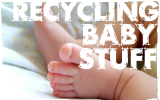How can I reduce the amount of cleaning products I use?
 Another of Alice‘s “Reduce This” questions is about cleaning products:
Another of Alice‘s “Reduce This” questions is about cleaning products:
How to reduce the amount of cleaning fluids I use, especially the ones which damage the environment the most? See my blog for an idea for free limescale remover…
Whenever I talk to anyone about this sort of thing, I always make a joke about how we’re being green (as opposed to just lazy) when we don’t keep our house all shiny and polished but there is some truth in it – a lot of people use a lot of chemicals to keep their house a lot “cleaner” than it really needs to be. (I’ve put cleaner in inverted commas because filling your house with harsh chemicals isn’t really health-clean either.)
My friend Katherine swears by E-Cloths and we use a lot of vinegar, soda crystals and borax here.
What do you use? Got any techniques to help cut down the amount of stuff you do use?
























The old standard for cleaning windows, newspaper, water and elbow grease! The problem is that remove the chemicals and you don’t get that ‘clean’ smell, but at least you can breathe.
Fresh flowers replace the chemical smell with a much nicer one!!
I cut the small sponges in two, and the bit bigger ones in three. That’s the ones I use for the dishes. A small one works just as well as a big one, and this way I get two or three in one. The ones for other kinds of cleaning I use so rarely that I still have sponges that were bought ten years ago and still look unused – even the one for the shower which is used once or twice a week. I wash them at least three or four times with the regular cleaning cloths and rags before I throw them in the recycling bin for plastics and metals, as pr. instruction from the municipality. It has also happened that I have boiled them.
As for packaging – vinegar comes in glass bottles, as does olive oil, so they are easily reused or taken to the recycling bin without tears. The baking soda comes in cardboard. The lemons come in their rind… And that’s what I use for cleaning.
Me again – search for “natural cleaners” and similar to find sites that explain *how* to use vinegar, baking soda, olive oil, and lemon in cleaning.
Last year I started using the Shaklee home cleaning products which basically consists of a natural formula called Basic H, that you mix in different quantities to get your all purpose cleaner, your glass cleaner, and your degreaser. You reuse the bottles when you need more, so there is no need to purchase bottles except the first time. The product is all natural so when you are done washing the floors, you can water your plants with the leftover water!
I like this solution because I can mix it myself and have all the supplies I need. There are only 3 bottles under my sink (Basic H concentrate, the window bottle and the all purpose bottle. I don’t have the degreaser yet). I clean everything with these 2 mixes.
http://www.shaklee.com/
I haven’t gotten into the baking soda and lemon use but I would like to learn how.
Last year I got the Shaklee home cleaning products which consist of a Basic H concentrate that you mix with water to create your different products (window cleaner, all purpose and degreaser).
You only have to buy the bottles once and use them to make more product. I only have 3 bottles under my sink.
The Basic H is all natural so you can water your plants with the water after you clean the floor!
Here is information on them. http://www.shaklee.com/ Look under the products > healthy home.
I haven’t yet gotten into the baking soda and lemon juice options, but would like to.
Bicarbonate of soda and vinegar work really well, I find. Also, if you have a sage bush, and it’s anything like ours, you’ll probably be cutting it back loads (How big can they grow???) and have lots of leaves going to waste…anyway, I digress….basically, the juice in sage leaves is a good antiseptic / disinfectant :)
I use baking soda to clean the kitchen sink, bathtubs, toilets etc. It is a good scrubber and works well.
I use vinegar anyplace I want to sanitize, such as kitchen appliances, counter tops, stove tops, table top etc. I also keep a spray bottle in the shower to spritz down the walls after each use and rarely have to do a complete cleanup.
I use vinegar in a spray bottle with newspapers to clean my windows. Works much better than towels or heavens forbid paper towels.
I use vinegar in the mop water when mopping floors. Cleans and gives a nice shine.
I use baking soda in the kitty box to freshen the litter after scooping.
I use baking soda for any obnoxious odors. Just put in a container and let it sit for awhile near the offending source.
I eliminate skunk odor from my pets after bathing with water, then applying baking soda and spritz with hydrogen peroxide, let sit for a few minutes, rinse well and voila! stink all gone. Tomato juice also works well but is very messy.
I use baking soda to scrub pots.
Well, I could go on and on. I used to use “recipes” found on the internet but in the end it boiled down to baking soda and vinegar works best for me.
I buy multipurpose organic cleaning solution in the largest packaging size possible and it lasts me a year or more. I put a tiny squirt of cleaning solution in a spray bottle, add 20 drops of tea tree oil and add water. It is good for cleaning all surfaces, including glass if you dilute it further and use a squeegee. Alternatively, I use diluted white vinegar for glass and mirrors. Baking soda is great for removing odours and scouring pots and pans. Biodegradable plant-based laundry soap powder can be used as an industrial strength cleaner, e.g. for cleaning the bathroom with. Half a scoop of soap powder mixed in half a bucket of water with 20 drops of tea tree oil is enough to clean 2 bathrooms with, if you use a scouring sponge. Normal vegetable oil based natural soap bars are great cleaning products too (for dishes, bathing, washing pets with, and for soaping up a rag for cleaning bikes, the car, pet enclosures, etc). Soap bars last longer and have the least packaging. Coconut oil soap with essential oils are great, long-lasting and quite inexpensive.
I swear by toothpaste.
It cleans glass, ceramics, and also whitens & removes stains from ALL white surfaces (white doors, white painted metals, laminate, etc).
The secret to this dilemma is to see what you can find to totally replace the chemical or possibly harmful products as part of your everyday cleaning regime.
As already suggested in this thread there are some fantastic more natural combinations that are incredibly effective but they just need a little preparation.
Bicarbonate of soda – fantastic
Toothpaste – can be slightly abrasive but fantastic for removing limescale
Baking soda with lemon juice
Organic cleansers
Persevere and you will get success
Thanks
Tim
House and Office Cleaning London